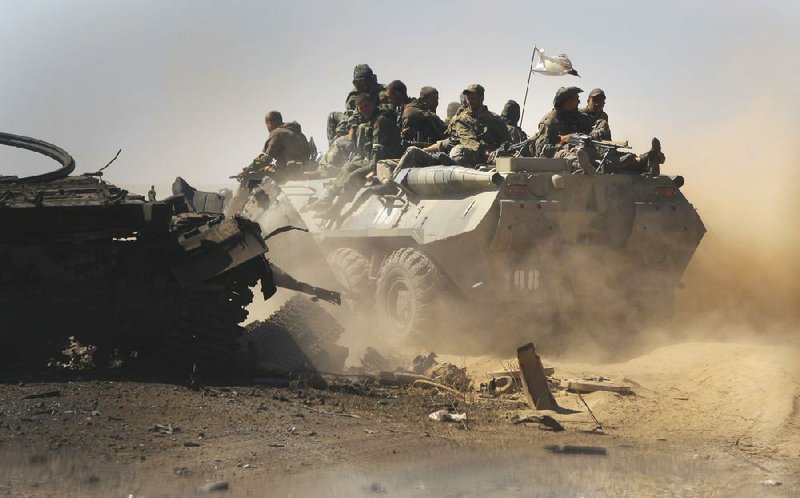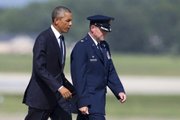MOSCOW -- Russia stepped up its criticism of the U.S. over Ukraine on Tuesday as President Barack Obama was heading to eastern Europe to reassure NATO members of their security.
Russian Foreign Minister Sergey Lavrov said Ukraine's allies are stoking the five-month conflict and should back peace talks.
"Unfortunately, the rise of the 'party of war' in Ukraine is being actively encouraged by Washington and some European capitals and more and more frequently from NATO headquarters in Brussels," Lavrov said.
Ukraine, the U.S. and Europe have accused Russia of dispatching its soldiers and backing pro-Russia rebels in a conflict the United Nations estimates has cost at least 2,500 lives.
Russian President Vladimir Putin has denied that his forces are invading Ukraine.
Meanwhile, the Kremlin sharply criticized European Commission President Jose Manuel Barroso on Tuesday, accusing him of breaching confidentiality after an Italian newspaper printed what it said were comments from Putin to Barroso.
Putin told Barroso: "If I want, I could take Kiev in two weeks," according to La Repubblica, which didn't identify a source for the information.
The remarks were taken out of context, Kremlin foreign-policy aide Yuri Ushakov said, adding that the disclosure of any details from such a conversation would be undiplomatic and "unworthy of a serious political player."
To address regional concerns about Russia, Obama is scheduled to meet in the coming days with the leaders of Estonia, Latvia and Lithuania, three former Soviet republics that are now part of the military alliance. He'll then head to Cardiff, Wales, where NATO is gathering.
Lavrov said any move by Ukraine to join NATO would upset peace talks that are due to continue Friday in Minsk, Belarus. He was responding to comments by Ukrainian Prime Minister Arseniy Yatsenyuk last week that lawmakers should vote on abandoning the nation's nonaligned status to join NATO.
The Ukraine conflict comes at a time when members of the NATO defense alliance have been cutting military spending and reassessing the organization's role after years of peace in Europe. While Ukraine is not part of NATO, alliance members in eastern and central Europe fear they could be Russia's next targets, prompting the 28-nation bloc to seek a more robust response.
"The current situation shows that the principle of collective territorial defense hasn't gone away -- on the contrary," Estonian President Toomas Hendrik Ilves said Sunday, marking the 20th anniversary of the exit of the last Russian troops from Estonian territory.
Obama and Western allies are expected to approve plans this week to position at least 4,000 troops and military equipment for a new rapid response force in eastern Europe.
While the specifics of the operation are to be decided when leaders meet Thursday in Wales, U.S. and European officials said it will involve training and deployments in the Baltics, Poland, Romania and other eastern European nations.
The U.S. has long provided troops for a NATO response force. Beginning Oct. 1, about 600 troops from the 1st Brigade, 1st Cavalry Division, based at Fort Hood, Texas, will be part of that effort.
However, the current rapid response force structure is seen as having little capability to deploy in meaningful numbers. The goal of the new effort will be to station forces that can deploy within 48 hours.
Obama also will use the NATO summit to urge allies to meet their commitments to devote at least 2 percent of GDP to military spending. Only four NATO nations currently meet that benchmark: the U.S., Britain, Greece and Estonia.
Obama will confront some rifts within the alliance when it comes to dealing with Russia. Despite tough talk about Moscow's behavior, France is proceeding with plans to send Russia warships, a move the U.S. and Britain have denounced.
Other nations are also concerned that the new rapid response force could violate a 1997 agreement with Moscow in which NATO pledged not to permanently station substantial numbers of soldiers in Eastern Europe. Officials said NATO is expected to get around that agreement by referring to its new military commitments as "persistent" rather than "permanent."
Russian buildup continues
Last week, NATO released satellite images of Russian tanks and other armored vehicles rolling into separatist-held areas of eastern Ukraine.
The Western military alliance also said there were at least 1,000 Russian troops in the area when the previously peaceful town of Novoazovsk was overrun a week ago, opening a new front in the 5-month-old battle between the pro-Russia separatists and Ukrainian government forces.
At his daily briefing Tuesday in Kiev, Col. Andriy Lysenko of the Ukrainian National Security and Defense Council said more Russian troops had been spotted in the separatist strongholds of Donetsk and Luhansk.
Convoys flying white flags signaling a humanitarian mission and sporting signs reading "Children" crossed a bridge into the village of Rozdolne, where four trucks approached Ukrainian troops, Lysenko said.
"Armed people jumped out of the trucks and opened fire at Ukrainian servicemen," Lysenko said. "Large-scale combat started."
Russian armed forces continue to build manpower and military equipment in the occupied areas, Lysenko said, noting recent encounters between Ukrainian troops and Russian forces in Donetsk, Luhansk and a broad array of smaller towns and villages between the rebel-held city centers and the Sea of Azov.
"According to our operational data, there are no fewer than four [Russian] battalion-tactical groups in Ukraine," Lysenko said, estimating that each comprised 400 men.
The buildup of Russian forces on Ukrainian territory has forced the government to revise its strategy from countering an insurgency to confront what is now an attack by a foreign invader, Ukrainian Defense Minister Valeriy Heletey said on his Facebook page.
"This is our Great Patriotic War," he wrote, alluding to the Soviet Union's costly victory over Nazi Germany in World War II.
The fighting began in April with pro-Russia separatists in the country's east rising up against Ukrainian troops a month after Russia annexed Crimea. The war has left more than 2,500 people dead and forced at least 340,000 to flee.
Rank-and-file Ukrainian troops increasingly have voiced exasperation at what they say is government mismanagement of the war. Anatoly Babchenko, a soldier captured briefly Sunday by the rebels, was unsparing in his criticism.
"First they drove people to hunger, and now they've driven them to war," Babchenko said from a basement cell at the Starobesheve police station. "They call this an anti-terrorist operation, but this is a civil war. Brother killing brother."
The fighting also has left Ukraine's economy in tatters. Ukraine might need billions in additional support if the fighting persists through next year, the International Monetary Fund said Tuesday. Just covering the shortfall in the central bank's reserves would require an additional $19 billion by the end of 2015, it said.
"Risks loom large" because of the fighting and the unresolved dispute with Russia over prices on gas imports and arrears, the IMF acknowledged in its first in-depth assessment since granting the country a $17 billion bailout program in March.
The IMF's bailout program depends on the conflict in Ukraine easing in the coming months. If that doesn't happen, "a new program strategy will be needed" that would involve significantly more financial aid, the IMF said.
Meanwhile, in Brussels, the European Commission pledged to propose a second round of economic penalties within the week to punish Russia over its reported incursions into Ukraine.
The bloc stayed united on previous measures against Russia and "will do so again with a new wave of sanctions," EU President Herman Van Rompuy said Tuesday.
German Chancellor Angela Merkel hinted that the EU plan was to tighten existing sanctions on Russia.
Information for this article was contributed by Henry Meyer, Daryna Krasnolutska, Jones Hayden, James G. Neuger, Ekaterina Shatalova and Kateryna Choursina of Bloomberg News; by Julie Pace, John-Thor Dahlburg, Liudas Dapkus, Jari Tanner, Lolita C. Baldor, Robert Burns, Peter Leonard, Vladimir Isachenkov, Juergen Baetz and Nataliya Vasilyev of The Associated Press; and by Carol J. Williams of the Los Angeles Times.
A Section on 09/03/2014



